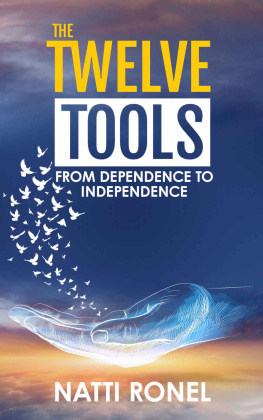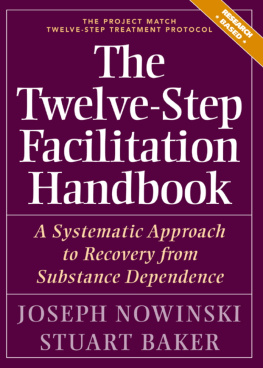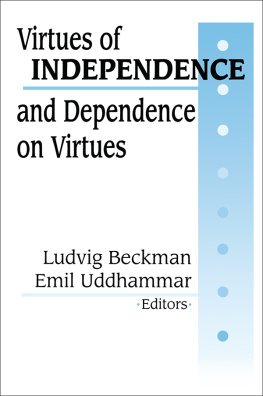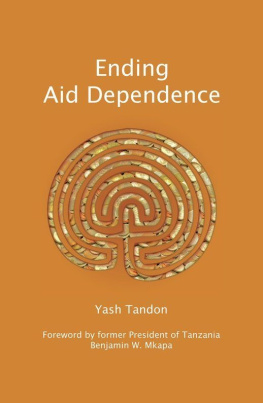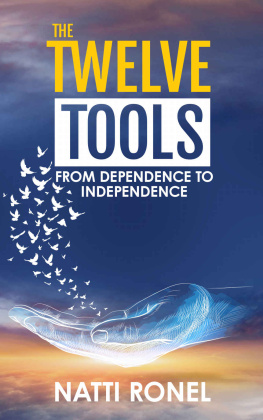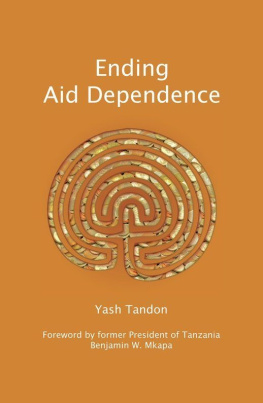Natti Ronel - The Twelve Tools: From Dependence to Independence
Here you can read online Natti Ronel - The Twelve Tools: From Dependence to Independence full text of the book (entire story) in english for free. Download pdf and epub, get meaning, cover and reviews about this ebook. year: 2019, publisher: Independently published, genre: Science. Description of the work, (preface) as well as reviews are available. Best literature library LitArk.com created for fans of good reading and offers a wide selection of genres:
Romance novel
Science fiction
Adventure
Detective
Science
History
Home and family
Prose
Art
Politics
Computer
Non-fiction
Religion
Business
Children
Humor
Choose a favorite category and find really read worthwhile books. Enjoy immersion in the world of imagination, feel the emotions of the characters or learn something new for yourself, make an fascinating discovery.
- Book:The Twelve Tools: From Dependence to Independence
- Author:
- Publisher:Independently published
- Genre:
- Year:2019
- Rating:5 / 5
- Favourites:Add to favourites
- Your mark:
- 100
- 1
- 2
- 3
- 4
- 5
The Twelve Tools: From Dependence to Independence: summary, description and annotation
We offer to read an annotation, description, summary or preface (depends on what the author of the book "The Twelve Tools: From Dependence to Independence" wrote himself). If you haven't found the necessary information about the book — write in the comments, we will try to find it.
Natti Ronel: author's other books
Who wrote The Twelve Tools: From Dependence to Independence? Find out the surname, the name of the author of the book and a list of all author's works by series.
The Twelve Tools: From Dependence to Independence — read online for free the complete book (whole text) full work
Below is the text of the book, divided by pages. System saving the place of the last page read, allows you to conveniently read the book "The Twelve Tools: From Dependence to Independence" online for free, without having to search again every time where you left off. Put a bookmark, and you can go to the page where you finished reading at any time.
Font size:
Interval:
Bookmark:

The Twelve Tools
From Dependence to Independence
Natti Ronel
Copyright 2018 Natti Ronel
All rights reserved; No parts of this book may be reproduced or transmitted in any form or by any means, electronic or mechanical, including photocopying, recording, taping, or by any information retrieval system, without the permission, in writing, of the author.
Translated by Philip Simpson
English translation supported by Schnitzer Foundation for Research on the Israeli Economy and Society at Bar-Ilan University, Israel
Contact:
Contents
Prologue
By our choices and actions we design and construct our reality, with the raw materials given by God.
Isaac was a man in his early forties. Energetic, intelligent, an executive and a successful contractor involved in major construction projects, in Israel and abroad. For all his varied activity, what was less successful was his marriage and domestic life. We met at a group for violent men which I led more than twenty years ago. As far as I can remember, he never physically battered his wife, but he threatened her a number of times and over the years his violence was expressed verbally, behaviorally, emotionally and socially. He was impatient in the home, towards her and the children, and at work he was tense, often losing his temper with his subordinates. He was an opinionated, judgmental and critical man. He came to the group having been excluded from his home by a legal injunction after threatening to injure his wife. He found himself powerless in a way that he had never known before. As a result of his powerlessness he was receptive. His common sense and intuition, together with a high level of practical acumen, led him to a rapid application of profound change. A few weeks later, when his relations with his wife were no longer at a crisis point, and his behavioral change had been well-received at home, he said to the group in a confessional moment: Its a pity I didnt come here twenty-five years ago. All our lives would have looked different. And were you ready then, twenty-five years ago, to change anything? I asked. Evidently not, he admitted sincerely, but its a pity, because I would have liked things to be different. Fortunately for us, we dont need to wait twenty years, or even five years. Things can be different, from today.
***
Lets start with a brief moment of silence. We leave everything behind us: thoughts, ideas, feelings, and sensations that may arise, both pleasant and unpleasant. We leave the distractions and focus on the silence. When we are quiet, we notice that silence has a timbre which can be heard, the sound of silence.... (In the silence exercises which follow the three dots [] indicate a pause. It is possible and also desirable in reading to pause at such a point before continuing.) Out of the silence that arises from within us, it is easier to pay attention to what will presently be said.
We are all in a process of change, from the day of our birth and even before it. Growth, development, maturity and even ageing are natural processes of change that we go through. And when society and culture change with us, we are influenced and changed accordingly. It seems as a species we are destined to change as is the world around us also destined to change according to the same nature. Sometimes the change is for the better, and this is wonderful. But sometimes the change seems not so good, and its results are undesirable -- for us, for the environment, for society. It happens.
The twelve tools of the Graceway, presented here for the first time in breadth and depth, sketch out a practical way of self-change and also a professional method of consultation, helping others to change. The way evolved gradually, out of the accumulated experience of many people who came from different backgrounds; it is simple and easy to follow, and it is particularly suited to this changeable contemporary world of ours. It offers something new and original, which is the combining of separate things into a whole way of change which is simple, fully developed, and essentially practical in a manner that suits twenty-first century people. The Graceway is a way that speaks of spiritual change, and applies it to daily life in a manner that is simple, natural, and feasible. The change itself is made with joy and love, in a fluid style that can suit almost anyone, irrespective of our backgrounds. The change, when it begins, opens before us something very basic -- the possibility of living our lives as we would really like to live them, without painful dependence and without recurrent compulsion. In almost every situation and under all circumstances, we can live just as we would really like to live according to our particular conditions, over which we have no control, and this is the direction of the Graceway.
Returning to Isaac. For a few weeks he came to the group meetings regularly, and he was fairly calm. Despite his sympathetic demeanor, I wasnt sure how much he was taking in, if anything at all. The holiday season arrived, and we skipped a meeting. Holidays, when all members of the family are spending time together, are usually like a powder-keg in a household where there is a background of violence, and when the explosion occurs is only a question of time.
At our meeting after the holiday, Isaac asked to speak. He told us that before the holiday, when he returned to his home after the expiration of the exclusion order, he realized that these were going to be tough and dangerous days, because neither of them -- husband nor wife -- was working over the holiday, and they would be together most of the time. In addition, the tension of his return home, combined with the enforced inactivity and anticipated boredom, seemed to him a guarantee of trouble, and to these factors could be added the postponement of our weekly meeting, which he needed as a way of charging his batteries. He remembered the group message of domestic peace and love, which it seems he had taken in, and he asked himself how he could implement it, as a way of preventing an explosion. In a moment of lucid clarity, out of fear of the imminent danger, he decided to do something different.
Until then, all the housework had been the exclusive responsibility of his wife, and he had barely lifted a finger to contribute. But in an insight, he asked his wife, much to her surprise, to step aside. This is all up to me, he told her. And indeed, it was all up to him. He did the shopping, cooked, prepared, cleaned up after himself and all over the house, including things that hadnt been cleaned in years. He did the laundry, hung out the washing, took it down and folded it, and even repaired things in the house that looked as if they needed it. He took on all the housework and thus enabled his wife and the grown-up children to take a break. According to his account, one day, while he was busily engaged in housework he saw his wife sitting and relaxing, reading a book. Unexpectedly, in a way that was quite uncharacteristic for him, he asked her: Like a coffee? He brewed it and served it to her, so she could go on reading in peace.
How did you feel? I asked.
Amazing. I saw they were happy and I was happy with them. I never felt this way before. I always waited for people to do things for me, and I still complained. It was self-explanatory; I didnt know how to love. Look at hanging out the washing, for example, it was hard for her. Her hands are smaller than mine. I never saw that. When I started hanging out the clothes, I understood. From now on, this will be my job exclusively.
A few weeks later, when hed started taking an interest in the upbringing of his children, his wife told him that the youngest daughter had been falling behind in school recently, apparently because of the tension in the house. She needs more boundaries, from you too, she told him.
Font size:
Interval:
Bookmark:
Similar books «The Twelve Tools: From Dependence to Independence»
Look at similar books to The Twelve Tools: From Dependence to Independence. We have selected literature similar in name and meaning in the hope of providing readers with more options to find new, interesting, not yet read works.
Discussion, reviews of the book The Twelve Tools: From Dependence to Independence and just readers' own opinions. Leave your comments, write what you think about the work, its meaning or the main characters. Specify what exactly you liked and what you didn't like, and why you think so.

